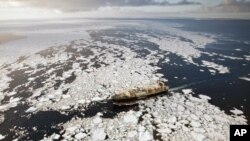A U.S.-based marine conservation group trying to scuttle Japan's annual whale hunt has pledged to avoid causing any harm to Japanese whalers as it chases them in waters off Antarctica.
Officials from several countries have urged the Sea Shepherd Conservation Society and the Japanese whalers to avoid violence during the current whaling season. Sea Shepherd lost a speedboat last January in a collision with a Japanese vessel it was pursuing.
Sea Shepherd Captain Paul Watson told VOA Thursday that his organization is not doing anything violent and accused the Japanese whalers of trying to kill him and his fellow conservationists. He was speaking by telephone from the Steve Irwin, one of two Sea Shepherd vessels chasing Japan's Nisshin Maru whaling ship in the Ross Sea.
Watson says the two vessels are trying to prevent the Nisshin Maru from being refueled by a Panamanian-registered ship, the Sun Laurel. He says a third Sea Shepherd vessel, the Gojira, has left the Australian port of Hobart after being repaired and will join the chase in several days.
Japan kills hundreds of whales a year under an exemption to a 1986 global whaling ban, which permits hunting for research purposes. Anti-whaling groups say Japan uses research as a cover to obtain whale meat for domestic consumption.
The Steve Irwin caught up to the Nisshin Maru on Tuesday after a 26-day pursuit spanning more than 6,000 kilometers. Watson says the chase has prevented Japan's whalers from catching many whales by forcing the fleet to divert two harpoon boats to following Sea Shepherd's vessels.
Watson says the Japanese fleet has a quota of 935 minke whales, 50 fin whales and 50 humpback whales. He says the conservationists limited the fleet to catching just under half of its quota last season, and pledged to do "a lot better" this year.
An International Whaling Commission meeting last year ended without resolving a decades-long dispute between Tokyo and anti-whaling nations that criticize annual Japanese hunts as cruel and unnecessary.
U.S. diplomatic cables published by the WikiLeaks website earlier this month quoted Japanese officials as saying Sea Shepherd's harassment of the whalers was making it hard for Tokyo to compromise in IWC negotiations on the future of whaling.
Watson says more than two decades of diplomacy have failed to resolve the dispute and the only way to stop Japanese whalers is to widen their financial losses.
The WikiLeaks documents said Japan urged the United States to take action against Sea Shepherd in November 2009. The documents quoted U.S. envoy to the IWC, Monica Medina, as telling Japanese officials that the Obama administration would consider revoking Sea Shepherd's tax-exempt status, based on what she called its "aggressive and harmful actions."
Watson says he has not heard of any plans by the U.S. government to revoke his group's tax status, a move he says would have no justification. But, he expressed concern about the comments attributed to Medina, saying it would be "illegal" for U.S. officials to penalize a U.S. organization at the request of a foreign government.
Conservationists Pledge to Avoid Harming Japanese Whalers During Chase
